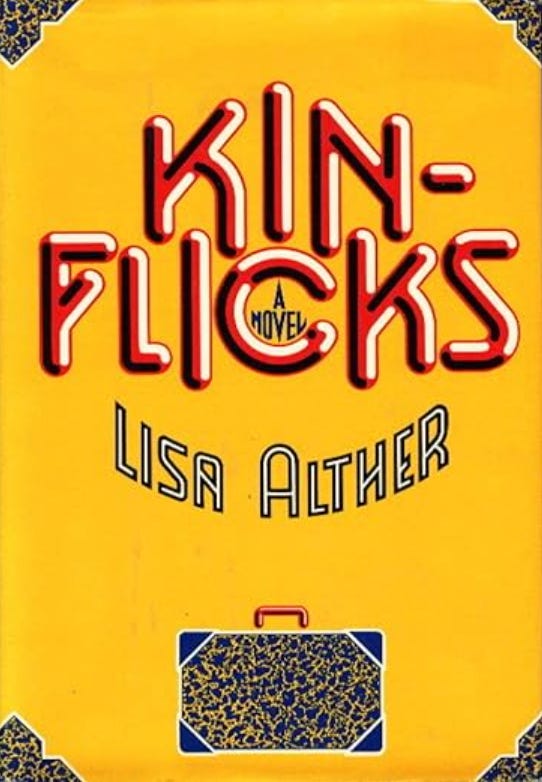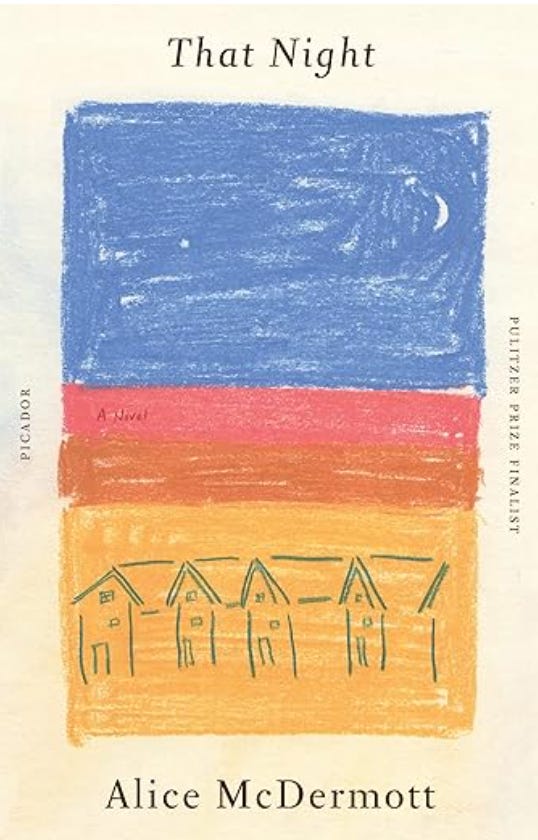I read a few novels as a more or less beginning writer that had a huge impact on what I understood fiction (not to mention, life) to be. There’s a scene in Lisa Alther’s Kinflicks (1976) where the main character claims that all of their family vacations had been to cemeteries so her mother could do grave rubbings of family graves. Her mother looks at her as if she’s crazy and said, “We did that once.”
Such a small thing but, reading it, I instantly, viscerally understood point-of-view. Both women believed they were telling the truth; maybe one or the other of them was right. But maybe neither was and the truth was something else.
Holy cow!
Differences in point-of-view create more important tension in a story than murders and car chases combined. Knowing how differently characters in a novel see the world and knowing the characters don’t know this themselves makes readers turn the pages to see how it’s all going to turn out.
Alice McDermott’s That Night (1987) made understand that how we experience a scene in our own lives and what we retain of it is profoundly dependent on who we are the moment the scene occurs.
That Night, set in suburbia during the early 1960s, begins “That night when he came to claim her, he stood on the short lawn before her house, his knees bent, is fists driven into his thighs, and bellowed her name with such passion that even the friends who surrounded him, who had come to support him, to drag her from the house, to murder her family if they had to, let the chains they carried go limp in their hands. Even the men from our neighborhood, in Bermuda shorts or chinos, white T-shirts and gray suit pants, with baseball bats and show shovels held before them like rifles, even they paused in their rush to protect her: the good and the bad—the black-jacketed boys and the fathers in their light summer clothes—were startled for that one moment before the fighting began by the terrible, piercing sound of his call.”
The narrator observes, “I remember only that my ten-year-old heart was stopped by the beauty of it all.”
She tumbles backward and forward telling the story of that night, trying to understand what actually happened, her point-of-view evolving from what her ten-year-self remembers to something closer to what may have actually happened.
The feel of this novel is what stayed with me. How the beauty and drama at “that night” got tangled up in the narrator’s view of the world itself and how the untangling changed her.
As I type this, it occurs to me that McDermott’s most recent novel Absolution is occurring at exactly the same time as That Night, the early 1960s—and, in a weird way, the setting of Absolution just outside Saigon, where the Vietnam War is heating up, is its own kind of suburbia. Also, as in That Night, the story is told from a distance, the narrator Patricia still trying to understand a brief but defining time in her life. Newlywed, still enthralled by being a wife, she comes to Saigon with her husband Peter, a corporate engineer with one of the numerous American companies there, having recently suffered a miscarriage.
Absolution begins with a long, mesmerizing description of her days.
“We were careful to secure the garter just so. Too close to the nylon risked a run.
“You cannot imagine the troubles suggested, in those days, by a stocking with a run: the woman was drunk, careless, unhappy, indifferent (to her husband’s career, even his affections), ready to go home.”
Then we’re at a Sunday afternoon garden party “…in an elegant courtyard of a villa not far from the Basilica. A lovely street lined with tamarind trees.” Patricia notices a young family—“Baby boy in the arms of the slim mother, daughter at her side, the tall father in a pale suit.” The mother is Charlene, who will moments later insert herself into Patricia’s life; the daughter, seven- or eight-year-old Rainey, to whom Patricia is telling this story years later.
Enamored of the children, Patricia (a kindergarten teacher in the year before her marriage) bends to look at the Barbie doll Rainey wants to show her. Moments later, she’s glad to take the baby when Charlotte says she needs to “tinkle.” When, to her horror, the baby vomits all down her beautiful new dress, she’s spirited away by the hostess and finds herself in the care of a Vietnamese girl Lily who helps her undress, washes her with lavender water and gives her a pink silk kimono to wear. In time, Charlene appears with Rainey and apologies. Rainey stays with Patricia to show her the Barbie clothes in her little patent leather purse and the two of them play until Lily takes the doll and makes her a tiny ao dai, the slim pants and long overdress Vietnamese women wear.
Thrilled by the Barbie ao dai, Charlene decides Vietnamese Barbies would be a great money-making project for her charities, one of which is bringing special treats to children in the hospital. There’s a good chance that some of the children are suffering from war injuries, though this is not mentioned. The war itself, happening just outside the barbwired walls of their compound, is for the most part ignored.
Talk about point-of-view!
Saigon is a lovely, exotic adventure these privileged white corporate wives. Something dark bubbles within Charlene, though, and her efforts to improve the lives of the Vietnamese grow increasingly reckless. Patricia, adrift in her empty life, is drawn in—if for no other reason than being busy eases her anxiety about whether she’ll ever be able to have a baby. .
I have to say that while Patricia telling the story to Rainey—occasionally, addressing her as “you”—adds to the urgency of the novel’s tone, I found it difficult to engage when, suddenly, I found myself in Rainey’s head in the present time telling a part of the story that didn’t seem to be crucial or even add much to what happened all those years before in Vietnam.
Well. Nothing’s perfect. Plus, Absolution offers a take on the Vietnam War I hadn’t considered before and so brilliantly conveyed that I recommend the novel, nonetheless.
One of its epitaphs comes from Graham Green, in The Quiet American: “…but how I wished there existed someone to whom I could say that I was sorry.”
To which everything in me says yes.
The other is from Siegfried Sassoon: “The anguish of the earth absolves our eyes.”
Which makes me wonder how absolution for Vietnam might work, why it matters for those who couldn’t have understood the part they played because of who they were, then.








Wonderful post! I absolutely loved absolution! And I agree with you it was less compelling when the point of you changed!
That's funny! Who knows, you could have had a whole other life:-)